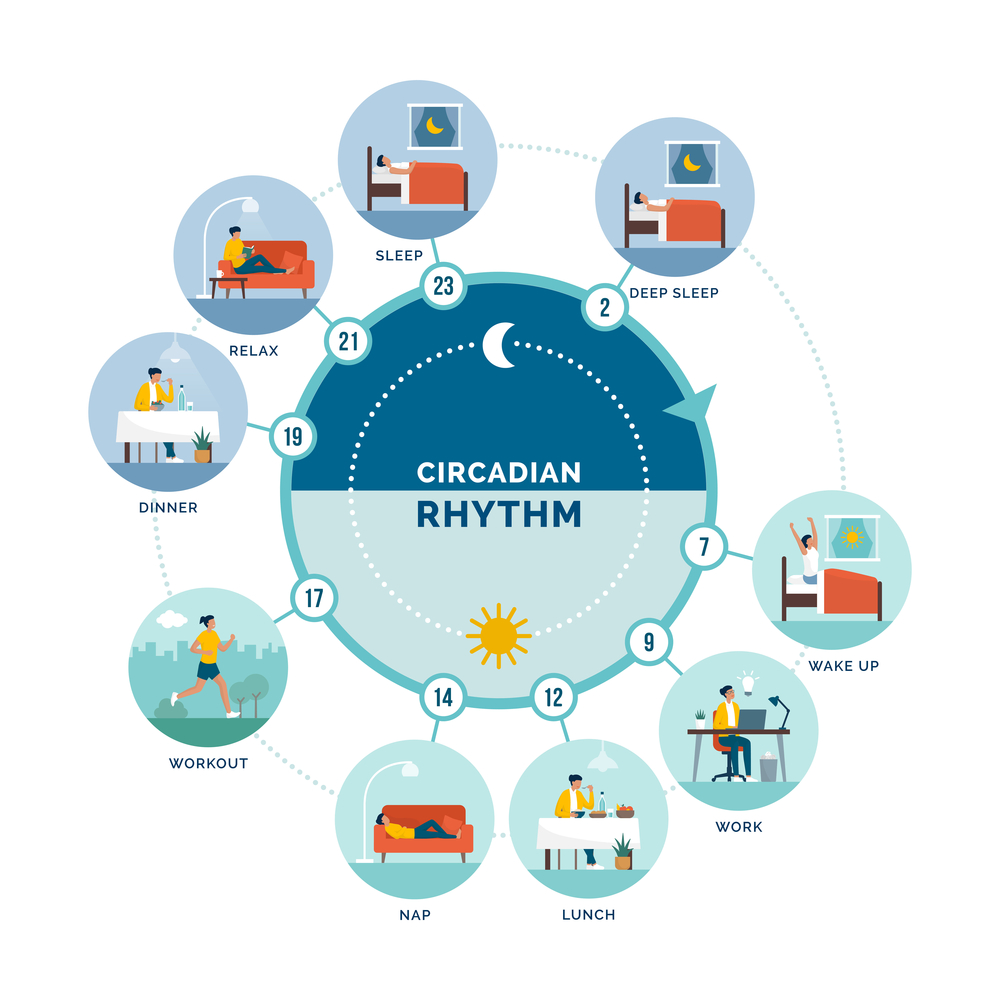Ever wondered why you’re a night owl or an early bird? It’s all about your circadian rhythms, and believe it or not, it’s tied to a little molecule called NAD+. This article will delve into the intriguing relationship between NAD+ and your body clock. You’ll discover how they interact, impact your sleep patterns, and potentially offer health benefits. You’re about to become well-versed in some truly cutting-edge biology!
Understanding NAD+ and Its Role in the Body
You’ve got to understand that NAD+ plays a pivotal role in your body’s energy production and cell repair mechanisms. As a key player in the biochemical process of converting food into energy, it drives cellular respiration, allowing cells to break down glucose and fatty acids efficiently.
NAD+ supplementation is an avenue you might consider exploring. It’s seen as a potential way to boost levels of this crucial coenzyme within your cells. You see, as we age or undergo metabolic stress, our natural NAD+ levels can decrease. Supplementing with external sources might help restore those levels, thereby improving cellular energy production.
Moreover, NAD+ is instrumental in activating enzymes called sirtuins which are involved in DNA repair and inflammatory response regulation. This connection suggests that maintaining optimal NAD+ levels could have far-reaching implications for health span and longevity.
To put it simply: The healthier your NAD+ status, the better your cells function across numerous biochemical pathways. It’s vital for efficient energy production and robust cellular repair systems – both integral to overall health and wellness. Thus understanding how NAD+, supplementation, and cellular energy production interconnect may provide insights into strategies for promoting human health span.
The Science Behind Circadian Rhythms
It’s fascinating to delve into the science that drives our internal biological clocks. You’re essentially entering the realm of Chronobiology Basics, a field studying rhythmic patterns in biological phenomena and their synchronisation with solar and lunar rhythms.
In this context, you’re dealing with your body’s circadian rhythms, guided by ‘Rhythmic Genes’. These are genes that follow a 24-hour oscillation pattern, regulating bodily functions such as sleep-wake cycles, feeding behavior and hormone production.

The master regulator of these rhythmic genes is located in the suprachiasmatic nucleus (SCN) in your brain. It receives light inputs from the eyes, enabling it to synchronize your internal clock with daylight hours.
But it doesn’t stop there. The intricacy lies within individual cells where ‘clock’ genes form a self-regulating feedback loop. Proteins encoded by these genes inhibit their own production once reaching a certain level, effectively creating an oscillation over approximately 24 hours.
Imagine it like a molecular pendulum swinging back and forth within each cell. This intricate process ensures that every function of your body works on time – from metabolism right down to gene expression itself. Understanding this science can pave the way for optimizing health and potentially treating disease.
The Interplay Between NAD+ and Circadian Rhythms
Diving deeper into this fascinating subject, let’s now examine how a coenzyme called NAD+ intricately interacts with your body’s biological clock. It’s a crucial player in maintaining your circadian rhythms, the internal “clocks” that regulate nearly every aspect of your physiology and behavior.
Your body continuously oscillates between periods of NAD+ build-up and breakdown, synchronized with your circadian rhythms. This is where NAD+ Supplementation comes in – it replenishes the levels of this vital coenzyme during phases of depletion, thus potentially mitigating Circadian Disruptions.
Let’s visualize these interactions:
1. NAD+ Cycle: Your cells produce NAD+ during the day to fuel metabolic processes. At night, they switch gears to conserve resources and repair damage incurred throughout the day.
2. Circadian Rhythm Influence: The rise and fall in NAD+ levels help signal when it’s time for certain physiological activities to take place.
3. Supplementation Impact: By supplementing with exogenous NAD+, you’re essentially providing raw materials for these cycles to continue smoothly even when disrupted.
Understanding this interplay could lend insight into novel therapies for sleep disorders or jet lag, emphasizing how critical our biological timings are for overall health.
Impact of NAD+ on Sleep Patterns and Biological Clock
There’s a significant impact on sleep patterns and the biological clock when NAD+ levels fluctuate, emphasizing the need for further research in this area. You’ll find that these fluctuations can disrupt your circadian rhythms, leading to poor sleep quality or even insomnia.
Now, here’s where things get interesting: recent studies suggest that NAD+ supplementation may be a potential solution for improving sleep quality. This is due to the role of NAD+ in regulating the biological clock and maintaining circadian rhythm stability.
The science behind this involves Sirtuins – proteins that depend on NAD+ – which play an essential role in controlling circadian rhythms. When your body lacks sufficient amounts of NAD+, it can result in Sirtuin deficiency, thus causing irregularities in your biological clock and impacting your sleep patterns.
NAD+ supplementation could boost Sirtuins functioning, thereby restoring balance to your circadian rhythms and improving your sleep quality substantially. However, while initial findings are promising, more comprehensive research is required to fully understand how NAD+ affects our sleep cycle.
Remember though, you shouldn’t start any supplementation regimen without consulting with a healthcare professional first. After all, achieving optimal health requires informed decisions based on scientific evidence.
Potential Health Benefits of NAD+ for Circadian Rhythms
You’ll be amazed at the potential health benefits that could come from having balanced NAD+ levels, particularly when it comes to your biological clock. This coenzyme plays a significant role in maintaining and enhancing circadian rhythms, which govern your sleep-wake cycle.
1. NAD+ Supplementation: Regular supplementation with NAD+ can increase its levels in the body, effectively restoring disturbed circadian rhythms. It aids in resetting your biological clock and consequently improving sleep quality and cycle regularity.
2. Delaying Aging Effects: A consistent balance of NAD+ may slow down aging effects on tissues and cells by boosting DNA repair mechanisms and reducing oxidative stress damage. This contributes to overall vitality extending beyond just improved sleep patterns.
3. Improved Metabolic Functions: Adequate NAD+ levels enhance metabolic processes such as energy production, nutrient absorption, and waste elimination-all regulated by the circadian rhythm.

Frequently Asked Questions
What Are Some Natural Ways to Increase Nad+ Levels in the Body?
You can naturally boost NAD+ levels through dietary influences, like eating more foods rich in niacin. Additionally, regular exercise impacts your NAD+ positively. Both contribute to overall health and cellular function.
Do Changes in Circadian Rhythms Affect the Body’s Nad+ Levels?
Yes, changes in your circadian rhythms do affect NAD+ levels. Disrupted rhythms can decrease NAD+, impairing energy production and accelerating aging. It’s essential to keep a regular sleep-wake cycle for optimal health.
Can Nad+ Supplements Help With Sleep Disorders?
Yes, NAD+ supplements can potentially assist with sleep disorders. However, the correct dosage is vital for optimal benefits. Overusing NAD+ might exacerbate insomnia, so it’s crucial to follow recommended dosage guidelines.
Are There Any Side Effects of Increasing Nad+ Levels in the Body?
While there’s no established toxicity level for NAD+, too much can potentially cause mild side effects like nausea, fatigue, or headaches. It’s important you monitor your body’s response when increasing NAD+ levels.
How Does Nad+ Interact With Other Bodily Functions Outside of the Circadian Rhythms?
NAD+ doesn’t just regulate your circadian rhythms, it’s also crucial in aging and cellular metabolism. It aids cell repair, fights oxidative stress, and fuels mitochondria, thus impacting various bodily functions outside of circadian rhythms.
